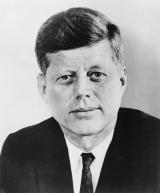Kto umawiał się z Marilyn Monroe?
John Fitzgerald Kennedy umawiał się z Marilyn Monroe od ? do ?. roku Różnica wieku wynosiła 9 lata, 0 miesięcy i 3 dni.
Marilyn Monroe

Marilyn Monroe (wym. /ˈmærəlɪn mənˈroʊ/), właśc. Norma Jeane Mortenson (ur. 1 czerwca 1926 w Los Angeles, zm. 4 sierpnia 1962 tamże) – amerykańska aktorka, modelka, piosenkarka i producentka filmowa. Gwiazda filmowa, ikona kultury popularnej i seksbomba lat 50. i 60. XX w. American Film Institute umieścił ją na szóstym miejscu na liście największych aktorek wszech czasów (The 50 Greatest American Screen Legends).
Karierę zaczęła w latach 40. jako pin-up girl. Później trafiła do świata filmu, gdzie pracowała dla 20th Century Fox (1946–47) i Columbia Pictures (1948). W 1951 związała się z wytwórnią Fox, wkrótce później zyskała popularność dzięki występom w filmach: Małpia kuracja, Niagara, Mężczyźni wolą blondynki czy Słomiany wdowiec. Zasłynęła z ról stereotypowych blondynek, ale wcielała się również w postacie bardziej złożone i dramatyczne. W 1955 studiowała aktorstwo metodyczne w Actors Studio u Lee Strasberga i założyła własną wytwórnię – Marilyn Monroe Productions. Za rolę Elsie w Księciu i aktoreczce otrzymała nagrody David di Donatello i Crystal Star Award, a za rolę Sugar „Kane” Kowalczyk w Pół żartem, pół serio zdobyła Złoty Glob. Film Skłóceni z życiem był ostatnim w jej karierze.
Wiele uwagi prasa poświęcała życiu prywatnemu Monroe. Aktorka zmagała się z uzależnieniami, m.in. od alkoholu i barbituranów, a także z zaburzeniami psychicznymi. Była trzykrotnie rozwiedziona, a jej małżeństwa z baseballistą Joe DiMaggio i dramaturgiem Arthurem Millerem były przedmiotem zainteresowania mediów. Nie miała dzieci.
Zmarła w 1962 w wieku 36 lat z powodu przedawkowania barbituranów w swoim domu w Los Angeles. Choć jej śmierć została uznana za „prawdopodobne samobójstwo”, wokół niej pojawiło się kilka teorii spiskowych.
Czytaj więcej...John Fitzgerald Kennedy

John Fitzgerald Kennedy (May 29, 1917 – November 22, 1963), also known as JFK, was the 35th president of the United States, serving from 1961 until his assassination in 1963. He was the youngest person elected president at 43 years. Kennedy served at the height of the Cold War, and the majority of his foreign policy concerned relations with the Soviet Union and Cuba. A member of the Democratic Party, Kennedy represented Massachusetts in both houses of the United States Congress before his presidency.
Born into the prominent Kennedy family in Brookline, Massachusetts, Kennedy graduated from Harvard University in 1940, joining the U.S. Naval Reserve the following year. During World War II, he commanded PT boats in the Pacific theater. Kennedy's survival following the sinking of PT-109 and his rescue of his fellow sailors made him a war hero and earned the Navy and Marine Corps Medal, but left him with serious injuries. After a brief stint in journalism, Kennedy represented a working-class Boston district in the U.S. House of Representatives from 1947 to 1953. He was subsequently elected to the U.S. Senate, serving as the junior senator for Massachusetts from 1953 to 1960. While in the Senate, Kennedy published his book Profiles in Courage, which won a Pulitzer Prize. Kennedy ran in the 1960 presidential election. His campaign gained momentum after the first televised presidential debates in American history, and he was elected president, narrowly defeating Republican opponent Richard Nixon, the incumbent vice president.
Kennedy's presidency saw high tensions with communist states in the Cold War. He increased the number of American military advisers in South Vietnam, and the Strategic Hamlet Program began during his presidency. In 1961, he authorized attempts to overthrow the Cuban government of Fidel Castro in the failed Bay of Pigs Invasion and Operation Mongoose. In October 1962, U.S. spy planes discovered Soviet missile bases had been deployed in Cuba. The resulting period of tensions, termed the Cuban Missile Crisis, nearly resulted in nuclear war. In August 1961, after East German troops erected the Berlin Wall, Kennedy sent an army convoy to reassure West Berliners of U.S. support, and delivered one of his most famous speeches in West Berlin in June 1963. In 1963, Kennedy signed the first nuclear weapons treaty. He presided over the establishment of the Peace Corps, Alliance for Progress with Latin America, and the continuation of the Apollo program with the goal of landing a man on the Moon before 1970. He supported the civil rights movement but was only somewhat successful in passing his New Frontier domestic policies.
On November 22, 1963, Kennedy was assassinated in Dallas. His vice president, Lyndon B. Johnson, assumed the presidency. Lee Harvey Oswald was arrested for the assassination, but he was shot and killed by Jack Ruby two days later. The Federal Bureau of Investigation (FBI) and the Warren Commission both concluded Oswald had acted alone, but conspiracy theories about the assassination persist. After Kennedy's death, Congress enacted many of his proposals, including the Civil Rights Act of 1964 and the Revenue Act of 1964. Kennedy ranks highly in polls of U.S. presidents with historians and the general public. His personal life has been the focus of considerable sustained interest following public revelations in the 1970s of his chronic health ailments and extramarital affairs. Kennedy is the most recent U.S. president to have died in office.
Czytaj więcej...